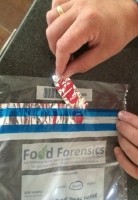Has remote compliance become business as usual?

As the pandemic’s implications rapidly unfolded before our eyes, we made some bold decisions to split our team into two bubbles, move the lab to seven days a week, and plan for business as usual.
We look back with immense pride that 12 months down the line we have maintained full service to our client base and attracted new business from various corners of the industry. However, this has not been without its challenges, and key to our planning was innovating through a crisis and embracing technologies that were sat under our noses.
Innovation during a crisis
First, we considered some of the challenges the food and beverage sectors were facing as we went into the pandemic. These included raw material integrity, the drive towards more technology adoption, and changing demands around audit and standards. We considered what these might look like as and when the dust began to settle.
What was clear was that these challenges were not going away. They were only going to become more important as the industry rebuilt itself, with a need for more transparency around raw material supply chains, and more robust approval processes.
COVID-19 has shed an unforgiving light on every flaw in the world’s supply chains, with unprecedented disruption. Layering on Brexit, the Suez crisis, and global weather challenges, could there ever be a better time than now for more certainty around raw materials?
Technology as an enabler
However, the opportunity to work with suppliers and add new aspects of complexity around raw material specifications and approvals has raised challenges, so we looked to technology to help.
The lack of Global Food Safety Initiative audits internationally has meant we have relied on virtual witness of facilities for maintaining compliance. It made sense to exploit the same technologies for our raw material sampling.
However, it is not just as simple as posting a sample off to the lab. We could not compromise the integrity of our database of fingerprints and had to give customers confidence in the provenance of samples arriving at the lab.
Therefore, as part of our sampling programs we have introduced security sealed and bar-coded bags. These are sent anywhere in the world to a facility, and samples are logged and remotely witnessed using a variety of media apps such as WhatsApp and Zoom. This gives us the geo-location of the sample, along with the date and time zone, and recognition of the person collecting the sample.
The samples are then sealed in tamper-proof bags, carry a unique ID that is matched upon arrival at the lab, and then checked for consistency with the claimed credentials.
Using our SafeGuard+ programme and digital partners, this is further verified by a complementary supply chain map, detailing the full supply chain and entities, adding a further level of comfort and transparency.
Working Smarter not Harder
This has worked incredibly well for us throughout the pandemic, but what is most interesting is the law of unintending consequence.
This is a smarter way of gathering and verifying raw materials, from a lower cost base, with faster turnaround times. It enables smarter unannounced sampling and has opened the global marketplace to us like never before.
Indeed, the act of taking samples sends a strong message to the supply base about your commitment to integrity, and as such delivers a front-line deterrent.
So, has remote risk management become business as usual? Perhaps not, but it has opened our eyes to new possibilities, more efficient ways of working, new collaborations, and more cost-efficient ways of gaining trust in supply chains that work for all parties.
We are particularly excited about the role we might play in earned recognition and chain of custody programs, enabling slick sampling and data driven verification. Compliance 2.0? We think so.
Rick Sanderson is business development director at Food Forensics
















